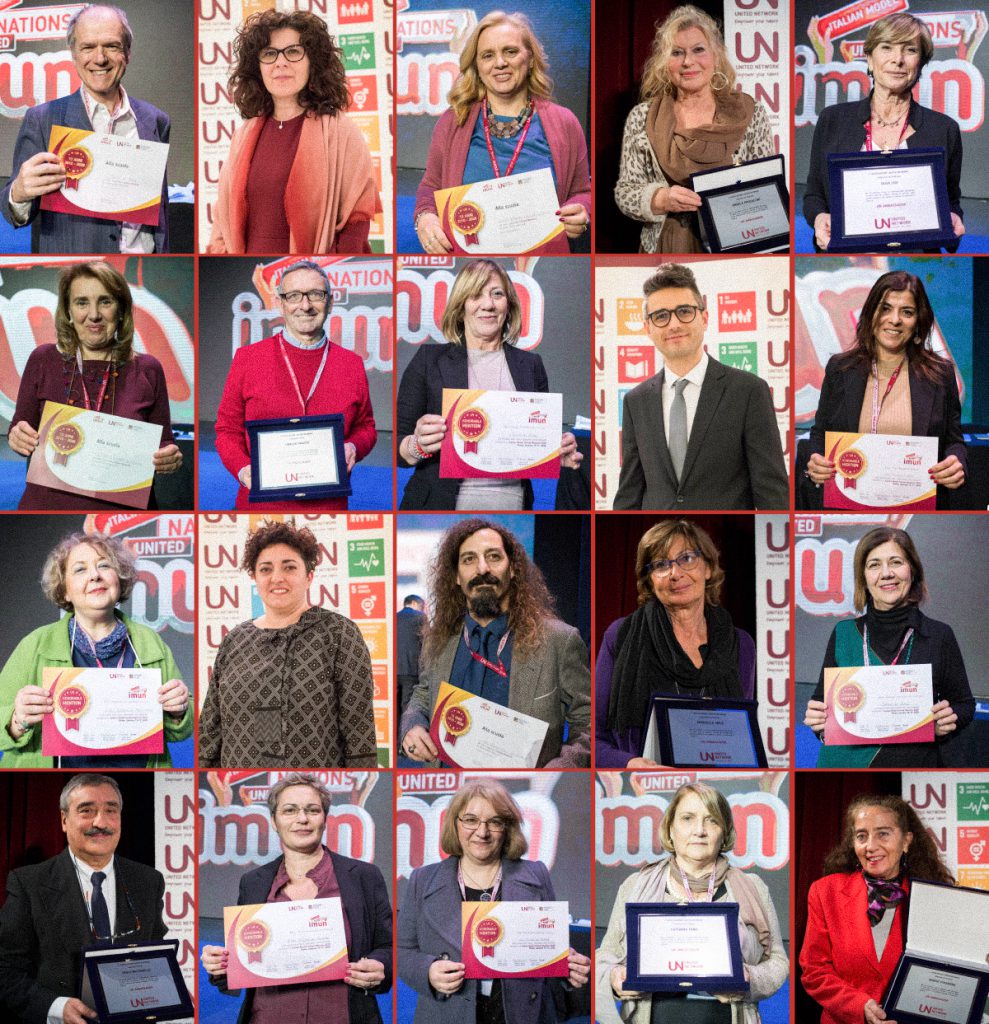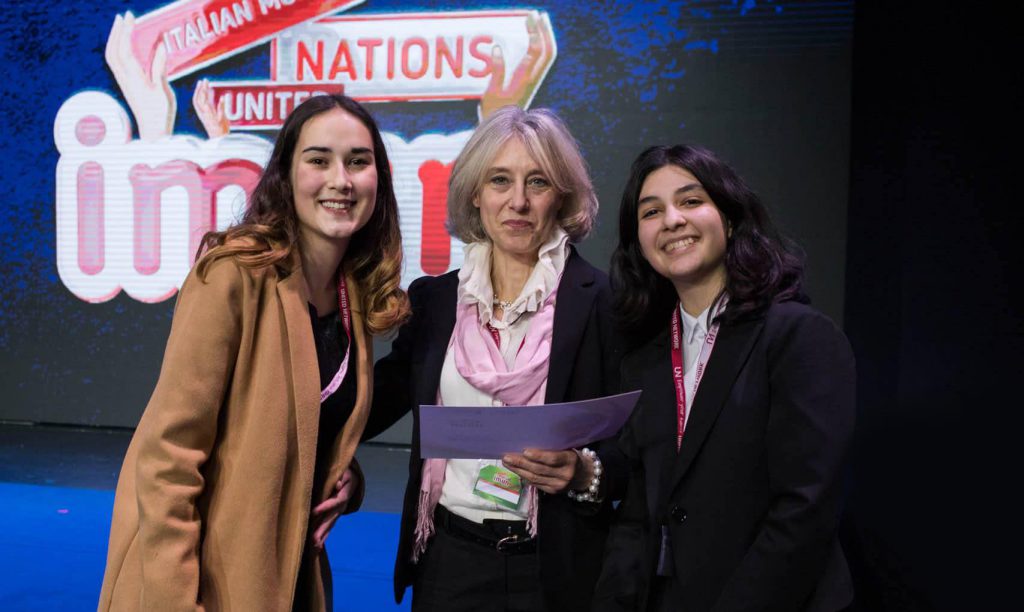Teaching Methodology
Among the teaching methodologies established in recent years, learning by doing represents the best training solution for simulated projects. It’s a great way to turn knowledge into skills. This means that the time needed to assimilate new knowledge will be reduced as the number of exercises increases. This is a circular process of learning, whereby the student is able to learn the skills that he or she needs to learn. This is a circular process of learning, centered on the active role of the student.

United Network,
schools
and teachers
a full sharing
of the formative
choices
United Network, schools and teachers: a full sharing of the formative choices
The simulations represent training courses of particular commitment and prestige; for this reason the selection and training of the student have a central role. Each student is subjected to a careful evaluation process aimed at verifying the possession of the minimum requirements for participation in the project. The minimum requirement is the aptitude and the level of motivation demonstrated by the candidate in relation to the topics covered, as well as the ability to address the delicate and complex issues covered by the simulation in a critical manner, through the development of original approaches and points of view. Limited to the simulations in language (English or French), the selection is also aimed at verifying the language skills of the candidate. Candidates are required to be able to understand and express themselves in language in a sufficient manner, postponing the acquisition of those specific linguistic skills related to the topics covered in the simulation to the following mandatory training phase. The selection phase sees the active participation of the schools and the teaching staff within the institutes, with a view to fully sharing the educational choices with the school, which is placed at the center of the entire project, with the function of directing the educational choices of the students. Each student who participates in the project takes part in the Training Course, which pursues several educational objectives. On the one hand, the basis for understanding the history and mechanisms of the assembly represented will be provided, and on the other hand, skills will be provided that will allow the student to operate in the simulated environment independently. Particular attention is turned to the use of computer and digital technologies, that in the phase antecedent to the simulation constitute the main environment of job. Particular attention is, finally, reserved for the university and post-university orientation, aimed at exposure and knowledge of all national and international study paths.

The projects are divided
in two phases:
- A preparatory phase, during which students study both the main topics of the assembly body represented, and how to operate within the simulation.
- An operational phase of direct action based on the method of learning by doing, in which students, putting what they have learned to good use, take on the role of “delegates”, “deputies” or “journalists” within the simulation.
Projects addressed
to class groups
To receive more details about the projects addressed to classes, school leaders and teachers can contact us at info@unitednetwork.it

We The European Union is a simulation of European Parliament sessions, during which participating students experience some of the main functions and activities of the European Parliament. After an introduction to the European institutions and their tasks, the simulation will focus on the construction and drafting of recommendations to member states. It will also proceed to the approval of a regulation and a directive prepared by the Commission and approved by the Council. It can be conducted, at the school’s choice, in Italian or English.

SchoolMUN is a simulation of international diplomatic processes during which participants will apply in practice all the work procedures and operating rules of international organizations, practicing, therefore, to operate as real delegates and experiencing, through a methodology and a specific preparation, the experience of working at a diplomatic body. It takes place in English.

Making News is a journalism workshop during which students will simulate the work of a newspaper by producing newspaper articles, launches, in-depth articles, news reports and taking part in a simulation of a press conference. The project takes place in Italian and its purpose is to introduce students to the world of journalism, alternating moments of frontal teaching, flipped classes and simulations.

Res Publica – art. 33 is a simulation of the sessions of the Italian Parliament during which students form themselves into parliamentary groups and carry out the typical functions of the deputies of the Republic, working on the drafting of bills, which are then discussed in the Committees and in the Chamber and preparing amendments and reports that will be approved using the same rules used in reality by parliamentarians and codified in the Rules of the Chamber of Deputies. It takes place in Italian.
European Camp
European Camp is an innovative teaching project based on the method of learning by doing that will take place in Ventotene (Latina) during the school year 2025-2026. The students, in a simulated session of the European Parliament, will pretend to be deputies, addressing within the model the issues that during the year will support this very important community institution. The project, attributable to the method of “challenge based learning”, can be carried out, at the choice of the school, in Italian or English.

All United Network projects are recognized by the school as pathways for cross-functional skills and career guidance. In order for the hours to be recognized for PCTO obligations (up to 70 hours per project), it is necessary for the educational institution to sign a complimentary agreement with our organization. Please note that the activities recognized for cross-functional skills and career guidance pathways are conducted by United Network as part of the pursuit of its mission and free of charge. The participation fees mentioned in the announcements pertain to participation in preparatory courses or supplementary tourism services.
The United Network simulations bring students closer to education, citizenship and informed study of the main representative institutions (Italian Parliament, European Parliament, United Nations). The implementation decrees of the Good School have in particular reformed the discipline of the State Exams, establishing that greater weight is given, in the final oral interview, to the skills of Citizenship and Constitution. All of United Network’s training courses have the precise aim of promoting among students a specific, high-level knowledge of representative bodies, how they function and the issues involved in the activities of democratic institutions.
United Network projects help internationalize the school’s profile by connecting students with peers from other cultures.
United Network’s projects are central to guiding high school students with respect to future college choices.
All United Network projects involve, among other things, the enhancement of the student’s computer skills, called upon to relate to tutors and coordinators through the Google Classroom platform.